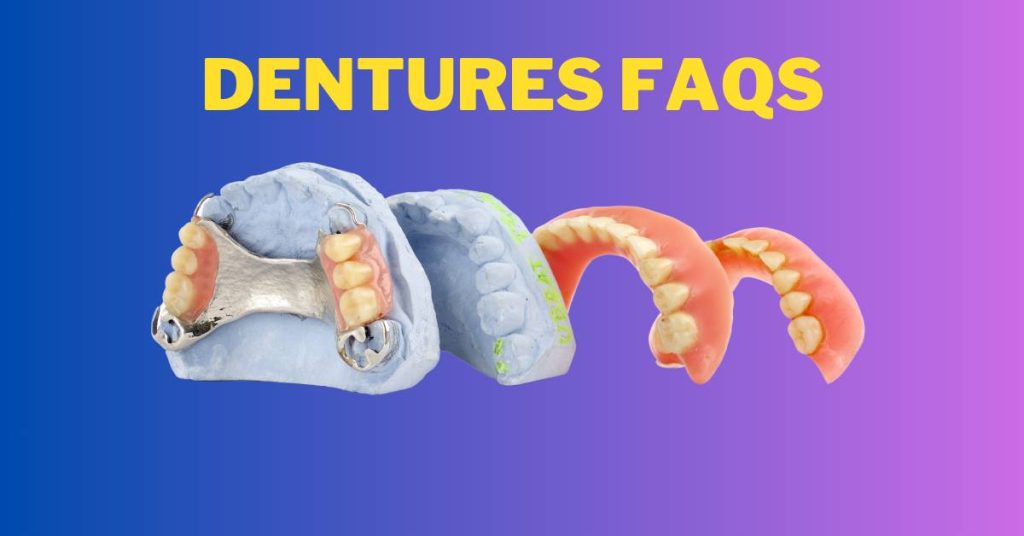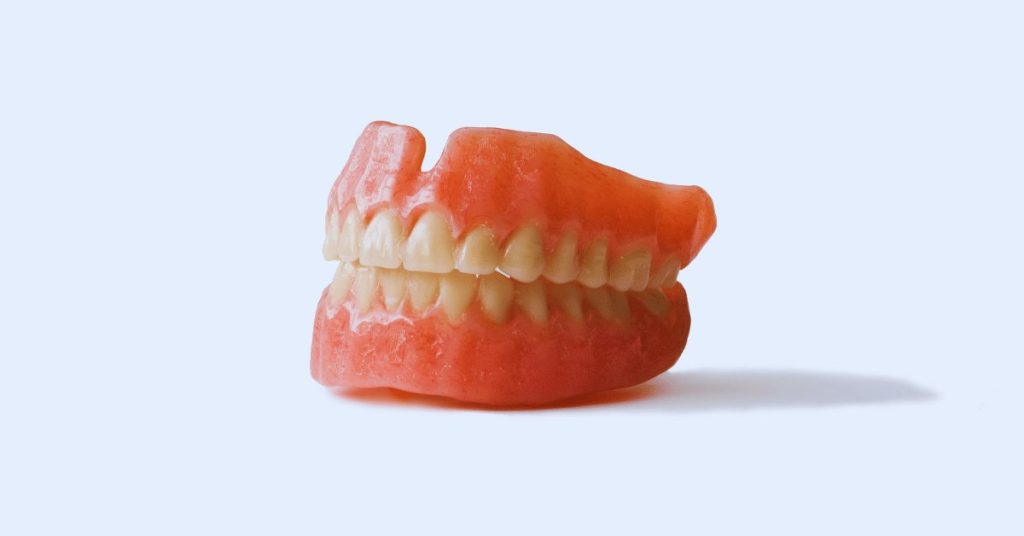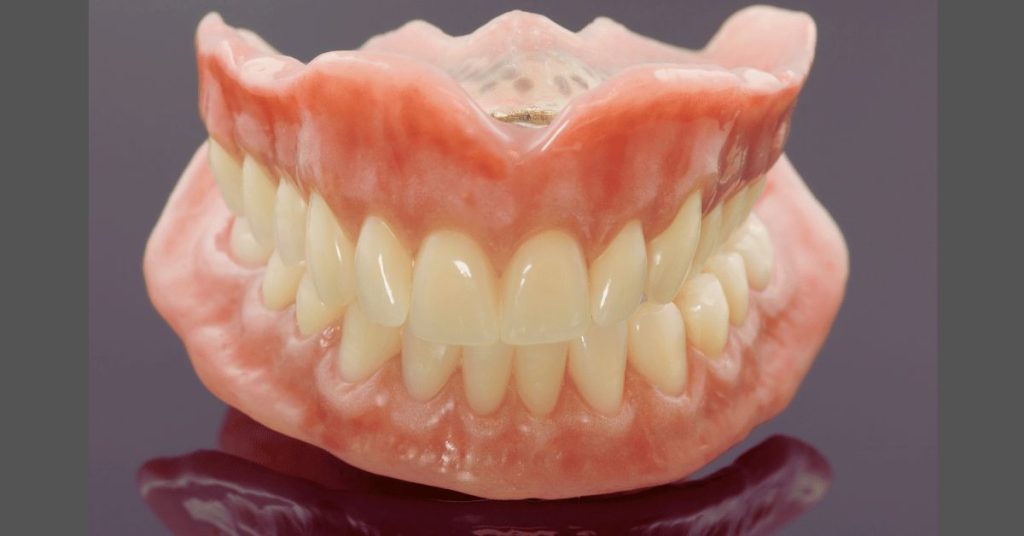Dentures FAQs-Your In-Depth FAQ Guide

Dentures FAQs: Answers to Your Most Pressing Dental Appliance Questions
Amidst the complexities of oral health, dentures emerge as a beacon of hope for individuals grappling with tooth loss. These remarkable dental appliances, meticulously crafted to restore lost smiles and functionality, serve as a testament to the ingenuity of modern dentistry.
Dentures, often perceived as mere replacements for missing teeth, transcend their physical form to embody a profound impact on an individual's life. They restore the ability to chew, speak, and smile confidently and rekindle self-esteem and overall well-being.
For those who have encountered the disheartening effects of tooth loss, dentures offer a lifeline, bridging the gap between diminished smiles and renewed vitality. They empower individuals to embrace their individuality, confidently engage in social interactions, and savour the pleasures of a nutritious diet.

The transformative power of dentures extends beyond aesthetics, encompassing a holistic approach to oral health. By restoring the natural balance of the jawbone, dentures prevent further bone loss, preserve facial structure, and prevent complications such as temporomandibular joint disorders.
Dentures, though often overlooked, stand as a cornerstone of restorative dentistry, offering individuals a path towards renewed self-assurance and enhanced quality of life. Their presence in the dental landscape is a testament to dentists' unwavering commitment to restoring smiles and empowering individuals to confidently embrace life.
Frequently Asked Questions about Dentures:
- What are dentures?
- Who needs dentures?
- What are the different types of dentures?
- What are the benefits of dentures?
- What are the disadvantages of dentures?
- How long does it take to get used to wearing dentures?
- Can I sleep with my dentures in?
- How long do dentures last?
- Can I eat normally with dentures?
- How do I clean and care for my dentures?
- How much do dentures cost?
- What types of dentures are available?
- How long does it take to get dentures?
- Are dentures comfortable to wear?
- How should I care for my dentures?
- Can dentures affect my speech?
- Will dentures look natural?
- Can I eat normally with dentures?
- How long do dentures last?
- Can I sleep with my dentures in?
- Are there any alternatives to dentures?
- Can I wear dentures if I have gum disease?
- Can dentures improve my facial appearance?
- How often should I visit my dentist with dentures?
- Can dentures be repaired if they break?
- Can I wear dentures while playing sports?
- Will dentures affect my ability to taste food?
- Can I wear dentures if I have sensitive gums?
- Can dentures improve my self-confidence?
- How much do dentures cost?
- Can I get dentures if I have gum disease?
- Can I smoke with dentures?
- How do I prevent dentures from clicking or slipping?
- Can I adjust the dentures myself?
- Can I sleep with my dentures?
- Can I eat normally with dentures?
- How do I clean my dentures?
- How often should I see my dentist for denture checkups?
- Bottom Line
What are dentures?
Dentures are removable dental appliances that replace missing teeth and restore the ability to chew, speak, and smile. They are typically made of acrylic resin and may be full dentures, replacing all teeth in an upper or lower jaw, or partial dentures, replacing only some teeth.
Who needs dentures?
Dentures are recommended for individuals who have lost all or most of their teeth due to various reasons, such as tooth decay, gum disease, or trauma. They can significantly improve oral function, aesthetics, and overall quality of life.
What are the different types of dentures?
The two main types of dentures are full dentures and partial dentures. Full dentures replace all teeth in the upper or lower jaw, while partial dentures replace only some teeth, leaving natural teeth in place.
What are the benefits of dentures?
Dentures offer numerous benefits, including:
- Improved chewing and eating ability
- Enhanced speech and articulation
- Restored facial appearance and self-confidence
- Reduced risk of bone loss in the jaw

What are the disadvantages of dentures?
Potential disadvantages of dentures include:
- Initial discomfort and adjustment period
- Risk of slippage and instability
- Increased saliva production
- Difficulty chewing certain foods
- Bone loss in the jaw over time
How long does it take to get used to wearing dentures?
The adjustment period for wearing dentures varies from person to person. Initially, it may take a few weeks to get used to the sensation of wearing dentures, and during this time, you might experience some discomfort or soreness. As you gradually adapt to wearing them, you'll become more comfortable, and your speech and eating abilities will improve. Following your dentist's instructions and practicing good oral hygiene will aid in the transition.
Can I sleep with my dentures in?
It is generally recommended to remove your dentures while sleeping. Resting your gums and jawbone can help maintain their health and prevent complications. Removing dentures at night also allows for proper cleaning and soaking to maintain oral hygiene. However, there might be certain situations where your dentist advises you to wear them during sleep for specific reasons. It's best to consult your dentist for personalized guidance.

How long do dentures last?
The lifespan of dentures can vary depending on several factors, including the quality of the dentures, how well they are cared for, and changes in your oral health over time. On average, dentures tend to last around 5 to 7 years before requiring replacement or adjustment. However, regular dental check-ups are essential, as your dentist will assess the condition of your dentures and recommend any necessary changes or replacements.
Can I eat normally with dentures?
Yes, you can eat various foods with dentures with time and practice. Initially, it's advisable to start with softer foods and gradually introduce more complex, chewier items into your diet. Chewing evenly on both sides of your mouth can provide stability while eating. Avoid biting into hard or sticky foods excessively, as they can damage or dislodge your dentures. If you experience persistent difficulties while eating, consult your dentist to ensure your dentures fit properly.
How do I clean and care for my dentures?
- Proper denture care is crucial for maintaining appearance, function, and longevity. Here are some essential care tips:
- Remove and rinse your dentures after eating to remove food particles.
- Brush your dentures daily using a soft-bristle brush and a non-abrasive denture cleaner or mild soap. Avoid using regular toothpaste, as it can be too abrasive.
- Soak your dentures overnight in a denture cleanser solution recommended by your dentist.
- Rinse your dentures thoroughly before wearing them.
- Brush your gums, tongue, and palate with a soft-bristle brush daily to stimulate circulation and maintain oral health.
- Visit your dentist regularly for check-ups and adjustments to ensure optimal denture fit and function.
Remember, if you have any specific concerns or questions about your dentures, it's always best to consult your dentist for professional advice and guidance tailored to your needs.
How much do dentures cost?
The cost of dentures can vary depending on factors such as materials used, type of denture, and additional procedures. Dentures can range from $500 to $2,500 per arch.
What types of dentures are available?
There are different types of dentures, including complete dentures (replacing all teeth), partial dentures (replacing some teeth), and implant-supported dentures (attached to dental implants).
How long does it take to get dentures?
Getting dentures usually takes a few weeks and involves several appointments with your dentist or prosthodontist.
Are dentures comfortable to wear?
Initially, it may take some time to adjust to wearing dentures. However, with proper fitting and adjustment, dentures can be comfortable.
How should I care for my dentures?
It's important to clean dentures daily using a brush and mild cleanser. They should be removed at night and stored in a denture-soaking solution.
Can dentures affect my speech?
Initially, dentures may affect your speech. However, with practice, most people adapt to wearing dentures and regain their natural speech patterns.
Will dentures look natural?
Modern dentures are designed to resemble natural teeth closely, and the appearance can be customized to match your unique features.
Can I eat normally with dentures?
With proper fitting and adjustment, dentures can restore much of your chewing ability, allowing you to eat various foods.
How long do dentures last?
The lifespan of dentures can vary, but good oral care and regular check-ups can last 5 to 10 years or even longer.
Can I sleep with my dentures in?
It is generally recommended to remove dentures at night to give your gums and tissues a chance to rest.
Are there any alternatives to dentures?
Yes, alternatives to dentures include dental implants, dental bridges, and implant-supported dentures.
Can I wear dentures if I have gum disease?
If you have gum disease, your dentist may recommend treating the underlying condition before considering dentures.
Can dentures improve my facial appearance?
Dentures can help restore the shape of your face and support the lips and cheeks, enhancing your facial appearance.
How often should I visit my dentist with dentures?
Regular dental check-ups are essential to ensure the fit of your dentures, monitor your oral health, and address any concerns.
Can dentures be repaired if they break?
Yes, dentures can often be repaired if they break or become damaged. It's essential to consult your dentist for proper repairs.
Can I wear dentures while playing sports?
Removing dentures during sports activities is generally recommended to prevent any potential damage or injury.
Will dentures affect my ability to taste food?
Dentures can slightly alter your sense of taste initially, but most people adjust over time and can usually enjoy food.
Can I wear dentures if I have sensitive gums?
Dentures can be customized and adjusted to accommodate sensitive gums, providing a more comfortable fit.
Can dentures improve my self-confidence?
Yes, dentures can significantly improve your smile, restore your ability to speak and chew properly and boost your self-confidence.
How much do dentures cost?
The cost of dentures varies depending on the type of denture, the materials used, and the dentist's expertise. Full dentures typically cost more than partial dentures.
Can I get dentures if I have gum disease?
Gum disease should be treated before getting dentures to ensure proper healing and prevent further bone loss.
Can I smoke with dentures?
Smoking can damage dentures and contribute to bone loss. It is strongly advised to avoid smoking while wearing dentures.
How do I prevent dentures from clicking or slipping?
Proper denture fit is crucial to prevent clicking or slipping. Regular dental checkups help ensure a well-fitting denture.
Can I adjust the dentures myself?
Never attempt to adjust dentures yourself. Always consult your dentist for any adjustments or repairs.
Can I sleep with my dentures?
While some people may sleep with their dentures, it is generally recommended to remove them at night to allow the gums and tissue.
Can I eat normally with dentures?
Eating with dentures may take some practice, but most people can eventually eat a normal diet. Start with soft foods and gradually introduce harder foods.
How do I clean my dentures?
Brush your dentures with a soft-bristled toothbrush and non-abrasive toothpaste or denture cleaner. Soak them in denture cleaner overnight to remove stubborn debris.
How often should I see my dentist for denture checkups?
Regular dental checkups are essential for denture wearers. Aim to see your dentist every 6 to 12 months for adjustments, cleaning, and oral health monitoring.
Bottom Line
As we conclude our exploration of dentures, it becomes evident that these remarkable dental appliances are not merely substitutes for missing teeth but instruments of empowerment and self-renewal. Through their ability to restore oral function, aesthetics, and self-confidence, dentistry has the profound potential to transform lives, allowing individuals to reclaim their smiles and embrace life with newfound zest.
Dentures symbolize hope in a world that often places a premium on physical appearance, allowing individuals to reclaim their smiles and exude self-assurance. By restoring the ability to chew, speak, and smile confidently, dentures empower individuals to engage fully in social interactions, pursue their passions, and embrace life without limitations.
The impact of dentures extends beyond aesthetics, reaching into the realm of oral health and overall well-being. By maintaining the natural balance of the jawbone, dentures prevent further bone loss, preserve facial structure, and prevent complications such as temporomandibular joint disorders. This, in turn, contributes to improved oral hygiene, reducing the risk of gum disease and other oral health issues.
Moreover, dentures have the potential to enhance self-perception and boost self-esteem. Individuals who have experienced the emotional toll of tooth loss often find solace in the renewed ability to smile without self-consciousness. This newfound confidence can ripple through their personal and professional lives, opening doors to new opportunities and enriching relationships.
Dentures represent more than just a dental restoration; they embody a holistic approach to well-being, encompassing physical, emotional, and social aspects of an individual's life. Their transformative power is a testament to the ingenuity of modern dentistry and the unwavering commitment of dentists to restoring smiles and empowering individuals to embrace life with confidence.

Recommendation